Impact of Travelodge's Eco-Friendly Initiatives on Consumer Decisions
VerifiedAdded on 2022/12/28
|21
|4911
|45
Report
AI Summary
This research report investigates the relationship between Travelodge's eco-friendly initiatives and their impact on consumer decision-making processes. The study begins with an introduction to consumer decision-making, exploring the various factors that influence customer behavior in the hospitality industry, followed by a literature review that covers the consumer decision-making process, eco-friendly strategies, and the connection between green initiatives and consumer choices. The methodology section outlines the research approach, including primary and secondary data collection methods. The data interpretation and analysis section presents the findings, examining the influence of Travelodge's eco-friendly practices on consumer behavior. The report concludes with recommendations for Travelodge to further enhance its eco-friendly strategies and improve consumer engagement. The report also discusses the impact of the COVID-19 pandemic on consumer behavior and the importance of sustainable practices for businesses.
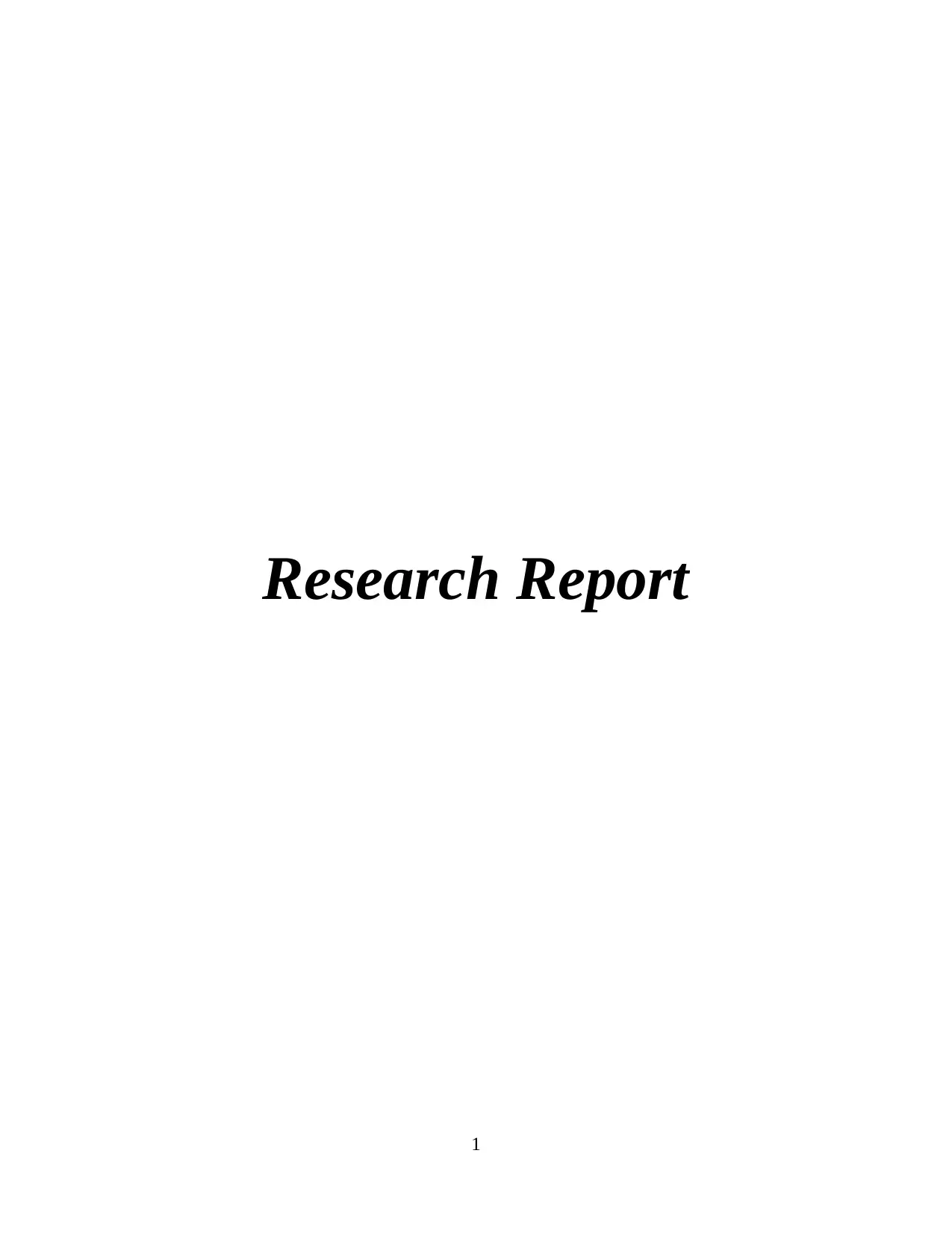
Research Report
1
1
Paraphrase This Document
Need a fresh take? Get an instant paraphrase of this document with our AI Paraphraser
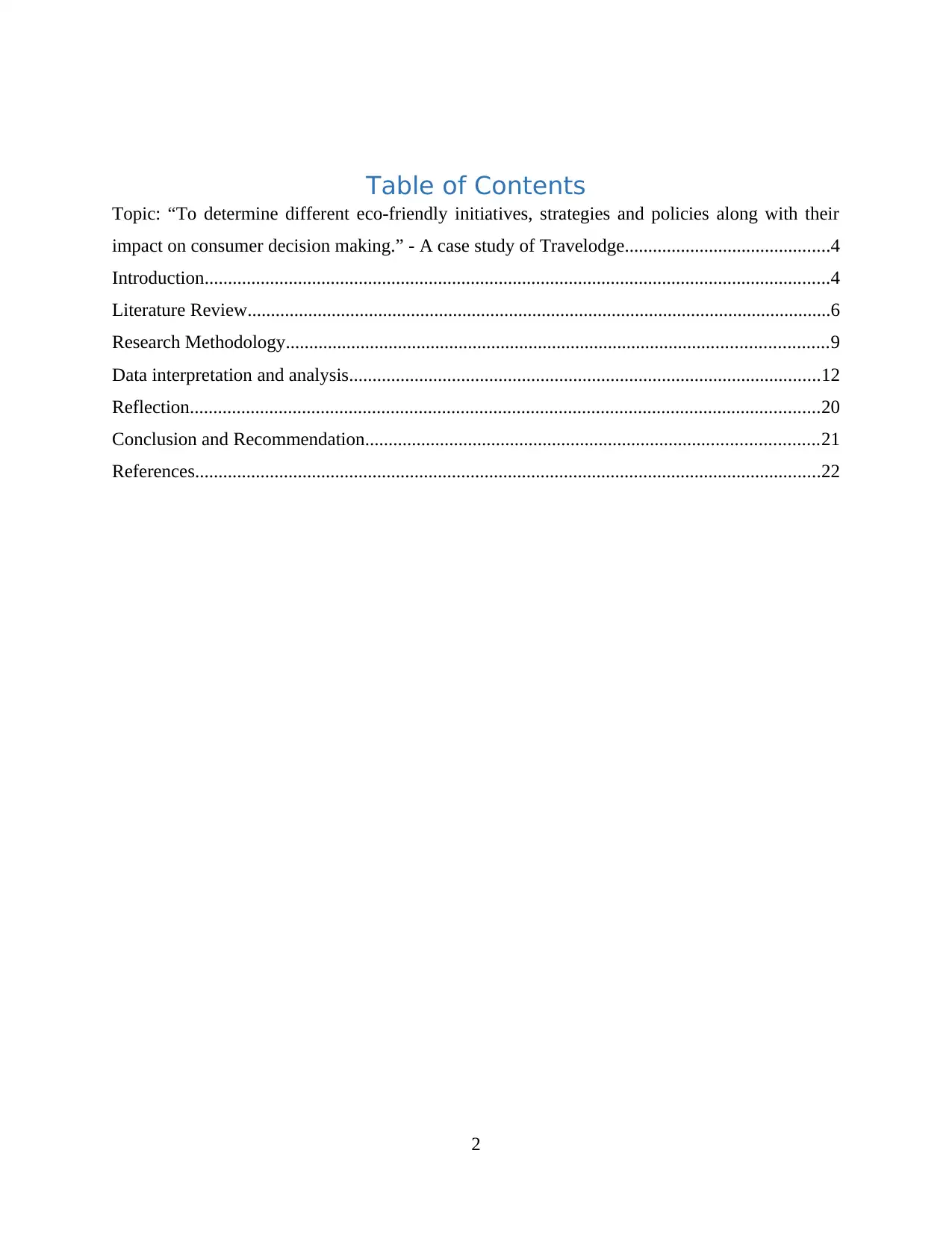
Table of Contents
Topic: “To determine different eco-friendly initiatives, strategies and policies along with their
impact on consumer decision making.” - A case study of Travelodge............................................4
Introduction......................................................................................................................................4
Literature Review.............................................................................................................................6
Research Methodology....................................................................................................................9
Data interpretation and analysis.....................................................................................................12
Reflection.......................................................................................................................................20
Conclusion and Recommendation.................................................................................................21
References......................................................................................................................................22
2
Topic: “To determine different eco-friendly initiatives, strategies and policies along with their
impact on consumer decision making.” - A case study of Travelodge............................................4
Introduction......................................................................................................................................4
Literature Review.............................................................................................................................6
Research Methodology....................................................................................................................9
Data interpretation and analysis.....................................................................................................12
Reflection.......................................................................................................................................20
Conclusion and Recommendation.................................................................................................21
References......................................................................................................................................22
2
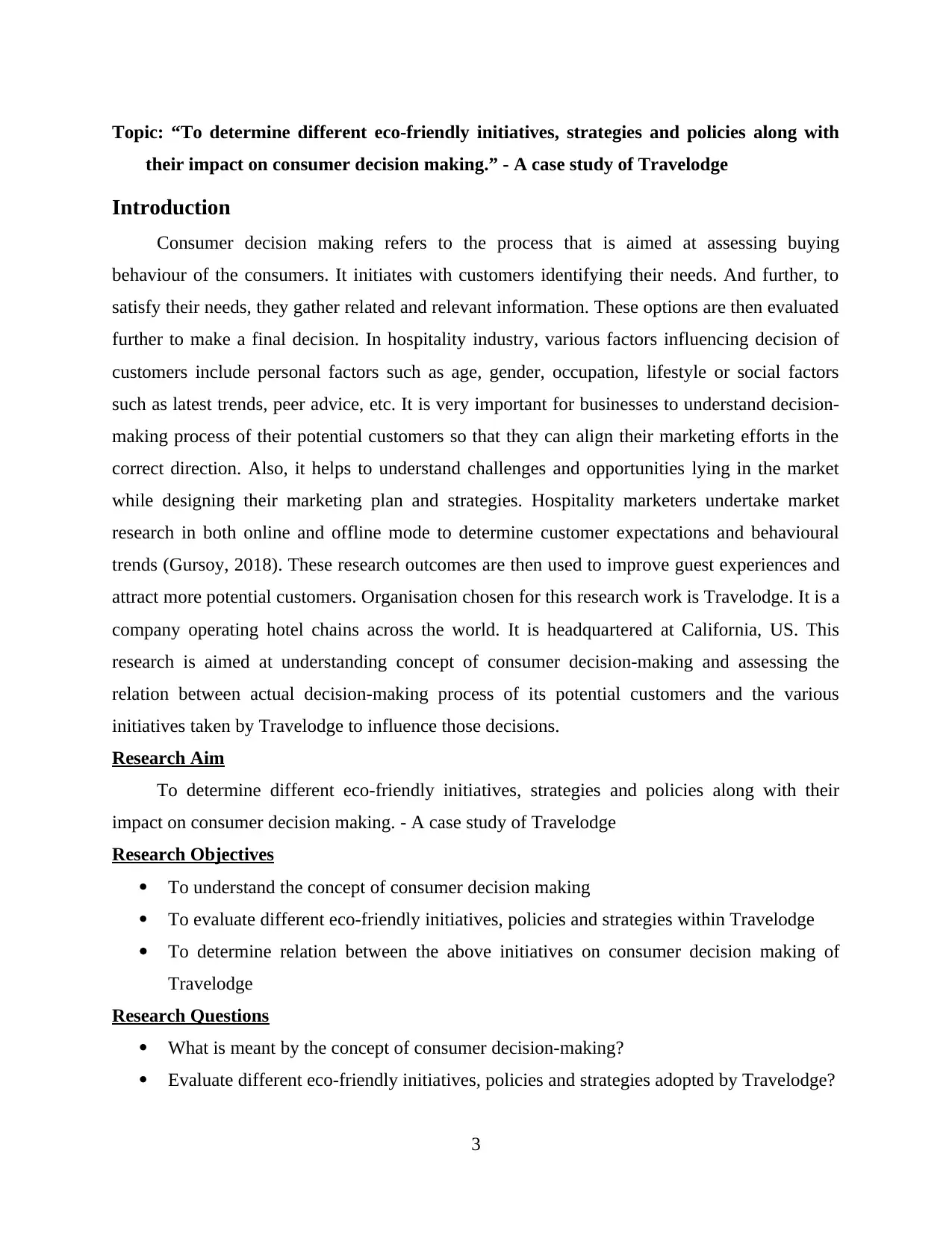
Topic: “To determine different eco-friendly initiatives, strategies and policies along with
their impact on consumer decision making.” - A case study of Travelodge
Introduction
Consumer decision making refers to the process that is aimed at assessing buying
behaviour of the consumers. It initiates with customers identifying their needs. And further, to
satisfy their needs, they gather related and relevant information. These options are then evaluated
further to make a final decision. In hospitality industry, various factors influencing decision of
customers include personal factors such as age, gender, occupation, lifestyle or social factors
such as latest trends, peer advice, etc. It is very important for businesses to understand decision-
making process of their potential customers so that they can align their marketing efforts in the
correct direction. Also, it helps to understand challenges and opportunities lying in the market
while designing their marketing plan and strategies. Hospitality marketers undertake market
research in both online and offline mode to determine customer expectations and behavioural
trends (Gursoy, 2018). These research outcomes are then used to improve guest experiences and
attract more potential customers. Organisation chosen for this research work is Travelodge. It is a
company operating hotel chains across the world. It is headquartered at California, US. This
research is aimed at understanding concept of consumer decision-making and assessing the
relation between actual decision-making process of its potential customers and the various
initiatives taken by Travelodge to influence those decisions.
Research Aim
To determine different eco-friendly initiatives, strategies and policies along with their
impact on consumer decision making. - A case study of Travelodge
Research Objectives
To understand the concept of consumer decision making
To evaluate different eco-friendly initiatives, policies and strategies within Travelodge
To determine relation between the above initiatives on consumer decision making of
Travelodge
Research Questions
What is meant by the concept of consumer decision-making?
Evaluate different eco-friendly initiatives, policies and strategies adopted by Travelodge?
3
their impact on consumer decision making.” - A case study of Travelodge
Introduction
Consumer decision making refers to the process that is aimed at assessing buying
behaviour of the consumers. It initiates with customers identifying their needs. And further, to
satisfy their needs, they gather related and relevant information. These options are then evaluated
further to make a final decision. In hospitality industry, various factors influencing decision of
customers include personal factors such as age, gender, occupation, lifestyle or social factors
such as latest trends, peer advice, etc. It is very important for businesses to understand decision-
making process of their potential customers so that they can align their marketing efforts in the
correct direction. Also, it helps to understand challenges and opportunities lying in the market
while designing their marketing plan and strategies. Hospitality marketers undertake market
research in both online and offline mode to determine customer expectations and behavioural
trends (Gursoy, 2018). These research outcomes are then used to improve guest experiences and
attract more potential customers. Organisation chosen for this research work is Travelodge. It is a
company operating hotel chains across the world. It is headquartered at California, US. This
research is aimed at understanding concept of consumer decision-making and assessing the
relation between actual decision-making process of its potential customers and the various
initiatives taken by Travelodge to influence those decisions.
Research Aim
To determine different eco-friendly initiatives, strategies and policies along with their
impact on consumer decision making. - A case study of Travelodge
Research Objectives
To understand the concept of consumer decision making
To evaluate different eco-friendly initiatives, policies and strategies within Travelodge
To determine relation between the above initiatives on consumer decision making of
Travelodge
Research Questions
What is meant by the concept of consumer decision-making?
Evaluate different eco-friendly initiatives, policies and strategies adopted by Travelodge?
3
⊘ This is a preview!⊘
Do you want full access?
Subscribe today to unlock all pages.

Trusted by 1+ million students worldwide
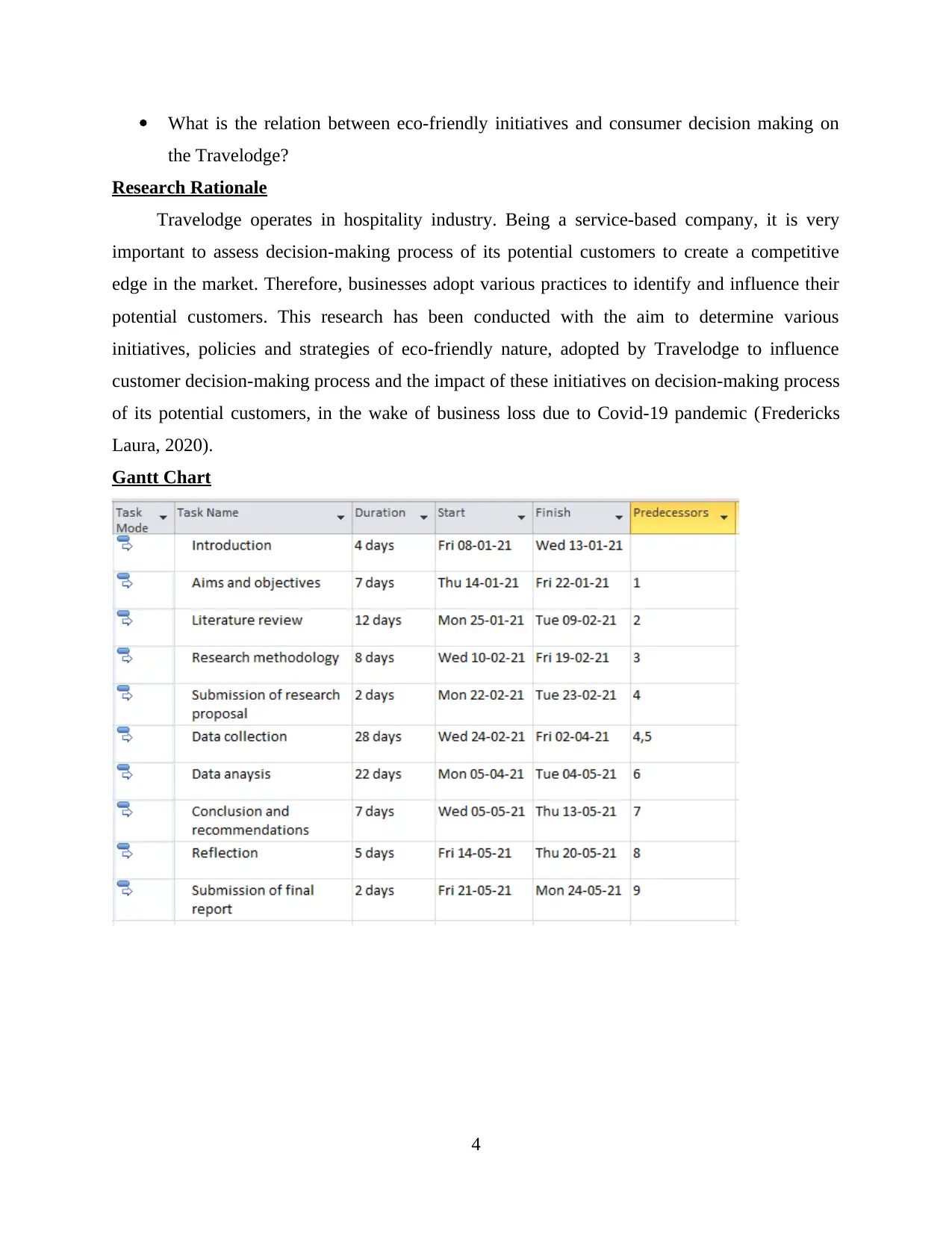
What is the relation between eco-friendly initiatives and consumer decision making on
the Travelodge?
Research Rationale
Travelodge operates in hospitality industry. Being a service-based company, it is very
important to assess decision-making process of its potential customers to create a competitive
edge in the market. Therefore, businesses adopt various practices to identify and influence their
potential customers. This research has been conducted with the aim to determine various
initiatives, policies and strategies of eco-friendly nature, adopted by Travelodge to influence
customer decision-making process and the impact of these initiatives on decision-making process
of its potential customers, in the wake of business loss due to Covid-19 pandemic (Fredericks
Laura, 2020).
Gantt Chart
4
the Travelodge?
Research Rationale
Travelodge operates in hospitality industry. Being a service-based company, it is very
important to assess decision-making process of its potential customers to create a competitive
edge in the market. Therefore, businesses adopt various practices to identify and influence their
potential customers. This research has been conducted with the aim to determine various
initiatives, policies and strategies of eco-friendly nature, adopted by Travelodge to influence
customer decision-making process and the impact of these initiatives on decision-making process
of its potential customers, in the wake of business loss due to Covid-19 pandemic (Fredericks
Laura, 2020).
Gantt Chart
4
Paraphrase This Document
Need a fresh take? Get an instant paraphrase of this document with our AI Paraphraser
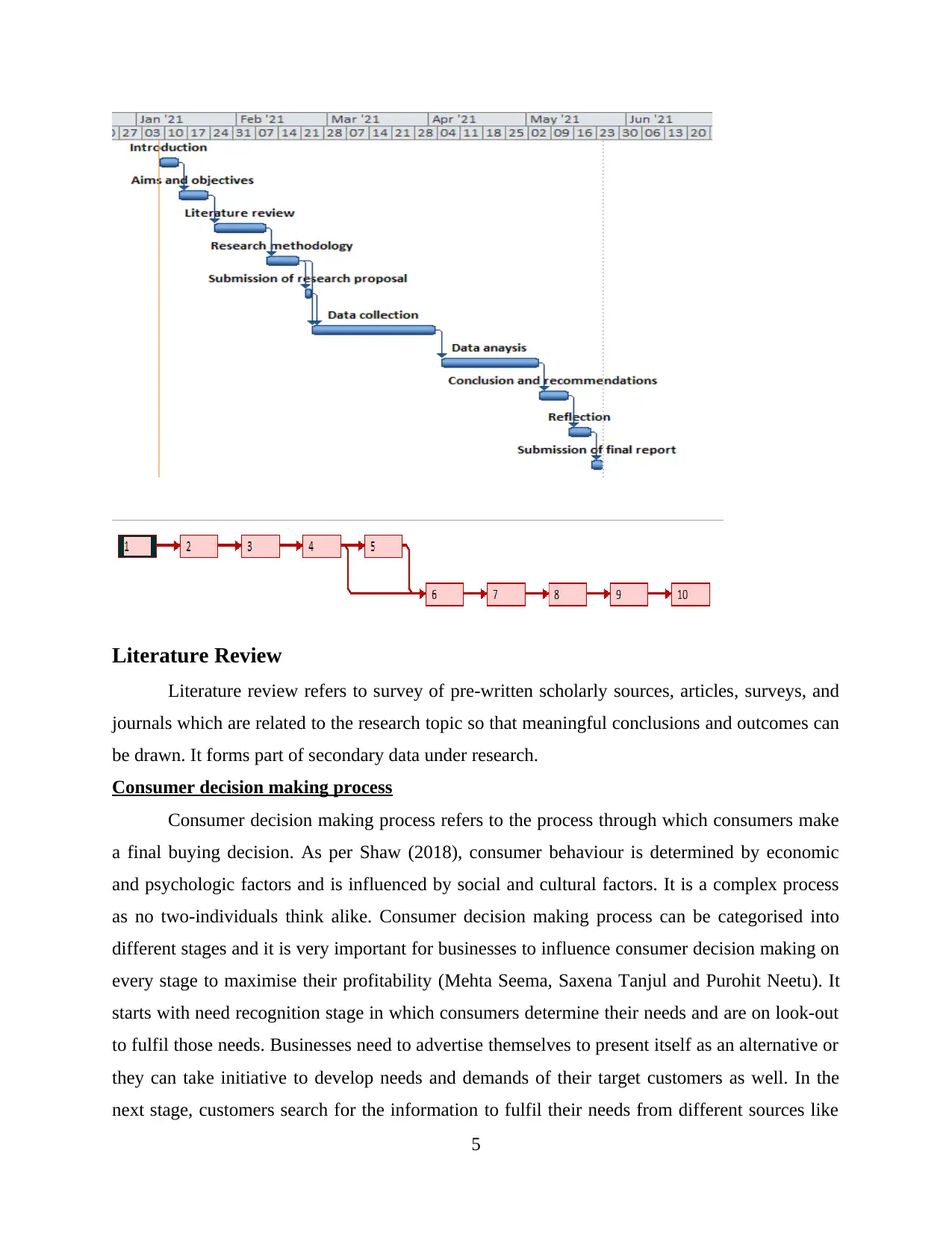
Literature Review
Literature review refers to survey of pre-written scholarly sources, articles, surveys, and
journals which are related to the research topic so that meaningful conclusions and outcomes can
be drawn. It forms part of secondary data under research.
Consumer decision making process
Consumer decision making process refers to the process through which consumers make
a final buying decision. As per Shaw (2018), consumer behaviour is determined by economic
and psychologic factors and is influenced by social and cultural factors. It is a complex process
as no two-individuals think alike. Consumer decision making process can be categorised into
different stages and it is very important for businesses to influence consumer decision making on
every stage to maximise their profitability (Mehta Seema, Saxena Tanjul and Purohit Neetu). It
starts with need recognition stage in which consumers determine their needs and are on look-out
to fulfil those needs. Businesses need to advertise themselves to present itself as an alternative or
they can take initiative to develop needs and demands of their target customers as well. In the
next stage, customers search for the information to fulfil their needs from different sources like
5
Literature review refers to survey of pre-written scholarly sources, articles, surveys, and
journals which are related to the research topic so that meaningful conclusions and outcomes can
be drawn. It forms part of secondary data under research.
Consumer decision making process
Consumer decision making process refers to the process through which consumers make
a final buying decision. As per Shaw (2018), consumer behaviour is determined by economic
and psychologic factors and is influenced by social and cultural factors. It is a complex process
as no two-individuals think alike. Consumer decision making process can be categorised into
different stages and it is very important for businesses to influence consumer decision making on
every stage to maximise their profitability (Mehta Seema, Saxena Tanjul and Purohit Neetu). It
starts with need recognition stage in which consumers determine their needs and are on look-out
to fulfil those needs. Businesses need to advertise themselves to present itself as an alternative or
they can take initiative to develop needs and demands of their target customers as well. In the
next stage, customers search for the information to fulfil their needs from different sources like
5
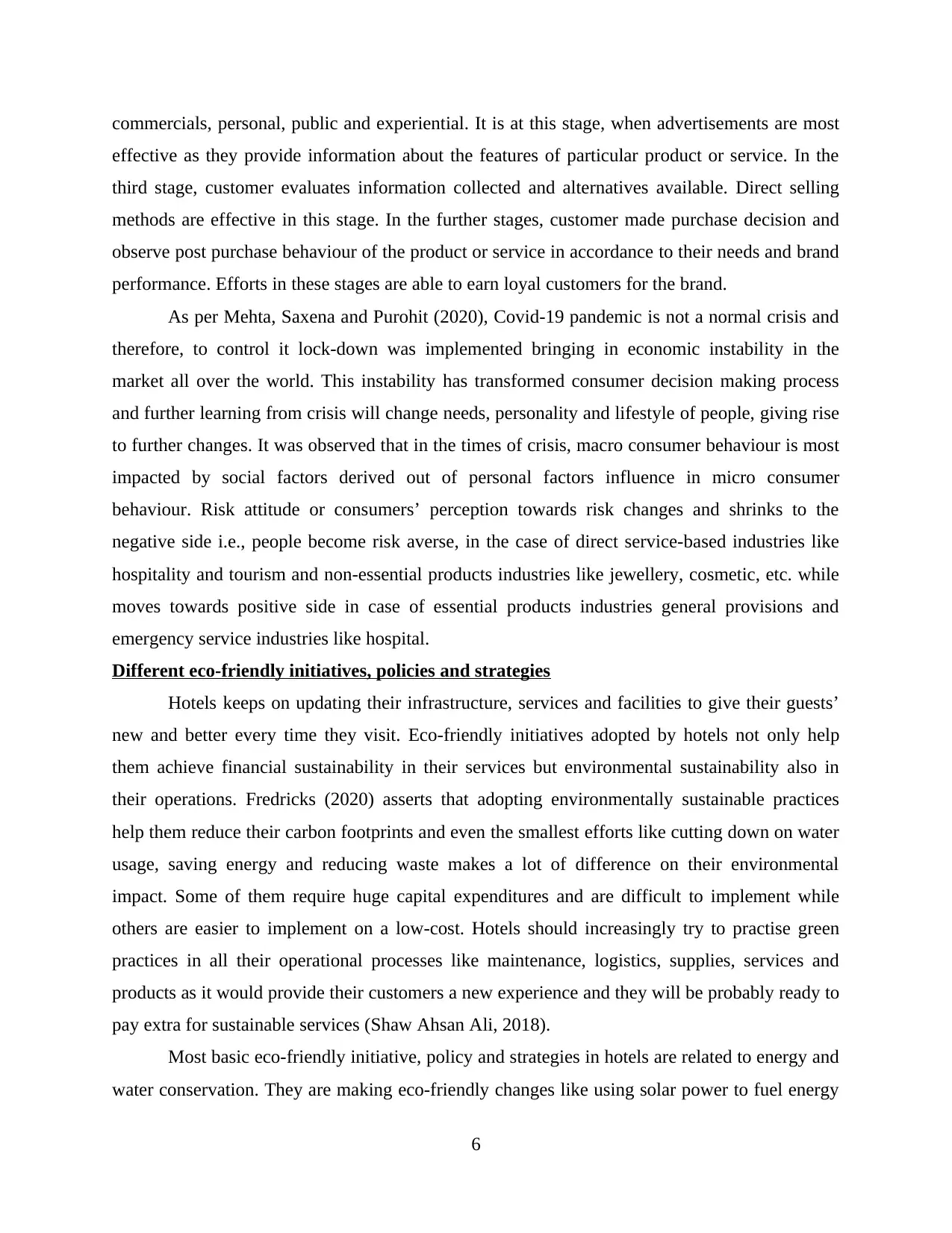
commercials, personal, public and experiential. It is at this stage, when advertisements are most
effective as they provide information about the features of particular product or service. In the
third stage, customer evaluates information collected and alternatives available. Direct selling
methods are effective in this stage. In the further stages, customer made purchase decision and
observe post purchase behaviour of the product or service in accordance to their needs and brand
performance. Efforts in these stages are able to earn loyal customers for the brand.
As per Mehta, Saxena and Purohit (2020), Covid-19 pandemic is not a normal crisis and
therefore, to control it lock-down was implemented bringing in economic instability in the
market all over the world. This instability has transformed consumer decision making process
and further learning from crisis will change needs, personality and lifestyle of people, giving rise
to further changes. It was observed that in the times of crisis, macro consumer behaviour is most
impacted by social factors derived out of personal factors influence in micro consumer
behaviour. Risk attitude or consumers’ perception towards risk changes and shrinks to the
negative side i.e., people become risk averse, in the case of direct service-based industries like
hospitality and tourism and non-essential products industries like jewellery, cosmetic, etc. while
moves towards positive side in case of essential products industries general provisions and
emergency service industries like hospital.
Different eco-friendly initiatives, policies and strategies
Hotels keeps on updating their infrastructure, services and facilities to give their guests’
new and better every time they visit. Eco-friendly initiatives adopted by hotels not only help
them achieve financial sustainability in their services but environmental sustainability also in
their operations. Fredricks (2020) asserts that adopting environmentally sustainable practices
help them reduce their carbon footprints and even the smallest efforts like cutting down on water
usage, saving energy and reducing waste makes a lot of difference on their environmental
impact. Some of them require huge capital expenditures and are difficult to implement while
others are easier to implement on a low-cost. Hotels should increasingly try to practise green
practices in all their operational processes like maintenance, logistics, supplies, services and
products as it would provide their customers a new experience and they will be probably ready to
pay extra for sustainable services (Shaw Ahsan Ali, 2018).
Most basic eco-friendly initiative, policy and strategies in hotels are related to energy and
water conservation. They are making eco-friendly changes like using solar power to fuel energy
6
effective as they provide information about the features of particular product or service. In the
third stage, customer evaluates information collected and alternatives available. Direct selling
methods are effective in this stage. In the further stages, customer made purchase decision and
observe post purchase behaviour of the product or service in accordance to their needs and brand
performance. Efforts in these stages are able to earn loyal customers for the brand.
As per Mehta, Saxena and Purohit (2020), Covid-19 pandemic is not a normal crisis and
therefore, to control it lock-down was implemented bringing in economic instability in the
market all over the world. This instability has transformed consumer decision making process
and further learning from crisis will change needs, personality and lifestyle of people, giving rise
to further changes. It was observed that in the times of crisis, macro consumer behaviour is most
impacted by social factors derived out of personal factors influence in micro consumer
behaviour. Risk attitude or consumers’ perception towards risk changes and shrinks to the
negative side i.e., people become risk averse, in the case of direct service-based industries like
hospitality and tourism and non-essential products industries like jewellery, cosmetic, etc. while
moves towards positive side in case of essential products industries general provisions and
emergency service industries like hospital.
Different eco-friendly initiatives, policies and strategies
Hotels keeps on updating their infrastructure, services and facilities to give their guests’
new and better every time they visit. Eco-friendly initiatives adopted by hotels not only help
them achieve financial sustainability in their services but environmental sustainability also in
their operations. Fredricks (2020) asserts that adopting environmentally sustainable practices
help them reduce their carbon footprints and even the smallest efforts like cutting down on water
usage, saving energy and reducing waste makes a lot of difference on their environmental
impact. Some of them require huge capital expenditures and are difficult to implement while
others are easier to implement on a low-cost. Hotels should increasingly try to practise green
practices in all their operational processes like maintenance, logistics, supplies, services and
products as it would provide their customers a new experience and they will be probably ready to
pay extra for sustainable services (Shaw Ahsan Ali, 2018).
Most basic eco-friendly initiative, policy and strategies in hotels are related to energy and
water conservation. They are making eco-friendly changes like using solar power to fuel energy
6
⊘ This is a preview!⊘
Do you want full access?
Subscribe today to unlock all pages.

Trusted by 1+ million students worldwide
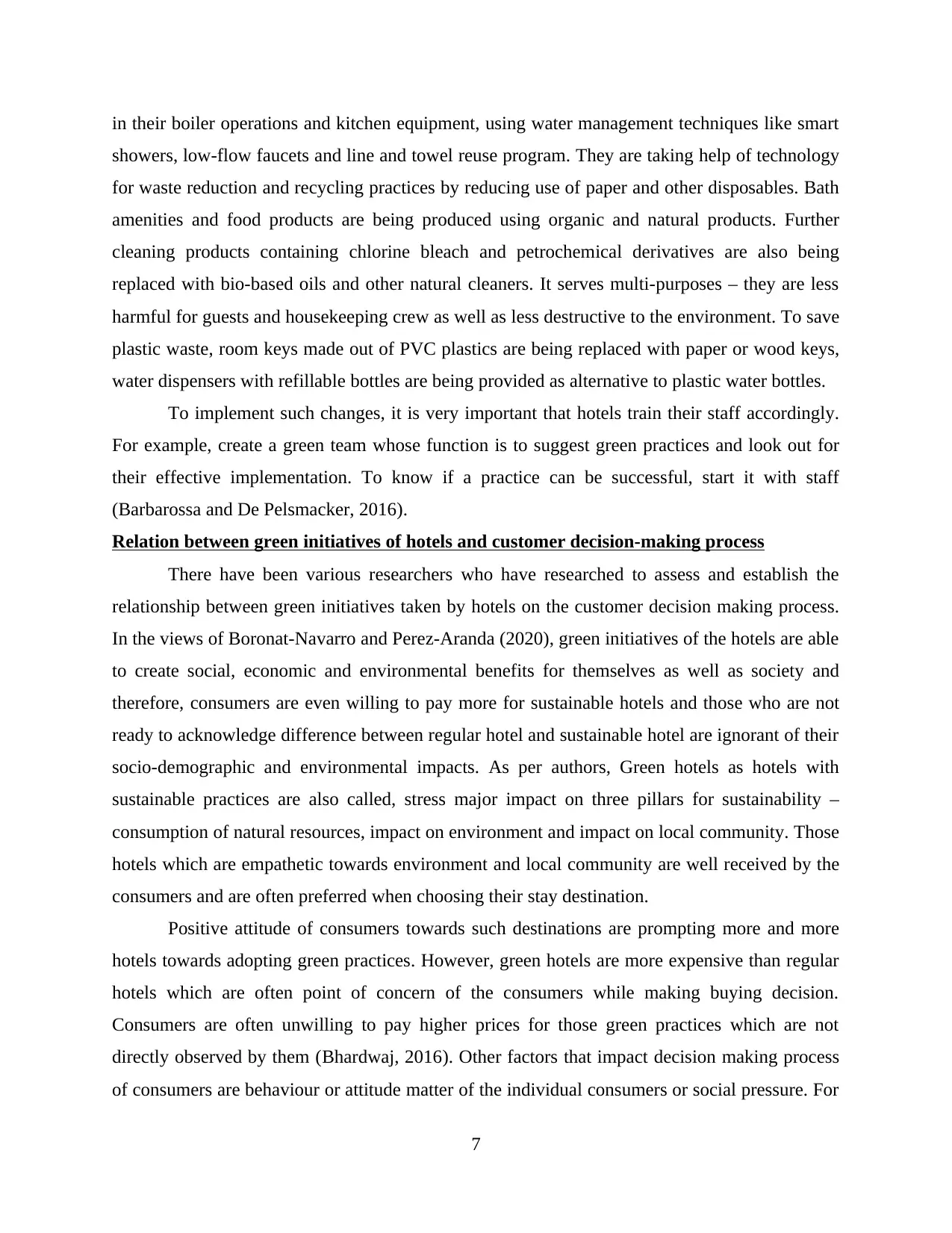
in their boiler operations and kitchen equipment, using water management techniques like smart
showers, low-flow faucets and line and towel reuse program. They are taking help of technology
for waste reduction and recycling practices by reducing use of paper and other disposables. Bath
amenities and food products are being produced using organic and natural products. Further
cleaning products containing chlorine bleach and petrochemical derivatives are also being
replaced with bio-based oils and other natural cleaners. It serves multi-purposes – they are less
harmful for guests and housekeeping crew as well as less destructive to the environment. To save
plastic waste, room keys made out of PVC plastics are being replaced with paper or wood keys,
water dispensers with refillable bottles are being provided as alternative to plastic water bottles.
To implement such changes, it is very important that hotels train their staff accordingly.
For example, create a green team whose function is to suggest green practices and look out for
their effective implementation. To know if a practice can be successful, start it with staff
(Barbarossa and De Pelsmacker, 2016).
Relation between green initiatives of hotels and customer decision-making process
There have been various researchers who have researched to assess and establish the
relationship between green initiatives taken by hotels on the customer decision making process.
In the views of Boronat-Navarro and Perez-Aranda (2020), green initiatives of the hotels are able
to create social, economic and environmental benefits for themselves as well as society and
therefore, consumers are even willing to pay more for sustainable hotels and those who are not
ready to acknowledge difference between regular hotel and sustainable hotel are ignorant of their
socio-demographic and environmental impacts. As per authors, Green hotels as hotels with
sustainable practices are also called, stress major impact on three pillars for sustainability –
consumption of natural resources, impact on environment and impact on local community. Those
hotels which are empathetic towards environment and local community are well received by the
consumers and are often preferred when choosing their stay destination.
Positive attitude of consumers towards such destinations are prompting more and more
hotels towards adopting green practices. However, green hotels are more expensive than regular
hotels which are often point of concern of the consumers while making buying decision.
Consumers are often unwilling to pay higher prices for those green practices which are not
directly observed by them (Bhardwaj, 2016). Other factors that impact decision making process
of consumers are behaviour or attitude matter of the individual consumers or social pressure. For
7
showers, low-flow faucets and line and towel reuse program. They are taking help of technology
for waste reduction and recycling practices by reducing use of paper and other disposables. Bath
amenities and food products are being produced using organic and natural products. Further
cleaning products containing chlorine bleach and petrochemical derivatives are also being
replaced with bio-based oils and other natural cleaners. It serves multi-purposes – they are less
harmful for guests and housekeeping crew as well as less destructive to the environment. To save
plastic waste, room keys made out of PVC plastics are being replaced with paper or wood keys,
water dispensers with refillable bottles are being provided as alternative to plastic water bottles.
To implement such changes, it is very important that hotels train their staff accordingly.
For example, create a green team whose function is to suggest green practices and look out for
their effective implementation. To know if a practice can be successful, start it with staff
(Barbarossa and De Pelsmacker, 2016).
Relation between green initiatives of hotels and customer decision-making process
There have been various researchers who have researched to assess and establish the
relationship between green initiatives taken by hotels on the customer decision making process.
In the views of Boronat-Navarro and Perez-Aranda (2020), green initiatives of the hotels are able
to create social, economic and environmental benefits for themselves as well as society and
therefore, consumers are even willing to pay more for sustainable hotels and those who are not
ready to acknowledge difference between regular hotel and sustainable hotel are ignorant of their
socio-demographic and environmental impacts. As per authors, Green hotels as hotels with
sustainable practices are also called, stress major impact on three pillars for sustainability –
consumption of natural resources, impact on environment and impact on local community. Those
hotels which are empathetic towards environment and local community are well received by the
consumers and are often preferred when choosing their stay destination.
Positive attitude of consumers towards such destinations are prompting more and more
hotels towards adopting green practices. However, green hotels are more expensive than regular
hotels which are often point of concern of the consumers while making buying decision.
Consumers are often unwilling to pay higher prices for those green practices which are not
directly observed by them (Bhardwaj, 2016). Other factors that impact decision making process
of consumers are behaviour or attitude matter of the individual consumers or social pressure. For
7
Paraphrase This Document
Need a fresh take? Get an instant paraphrase of this document with our AI Paraphraser
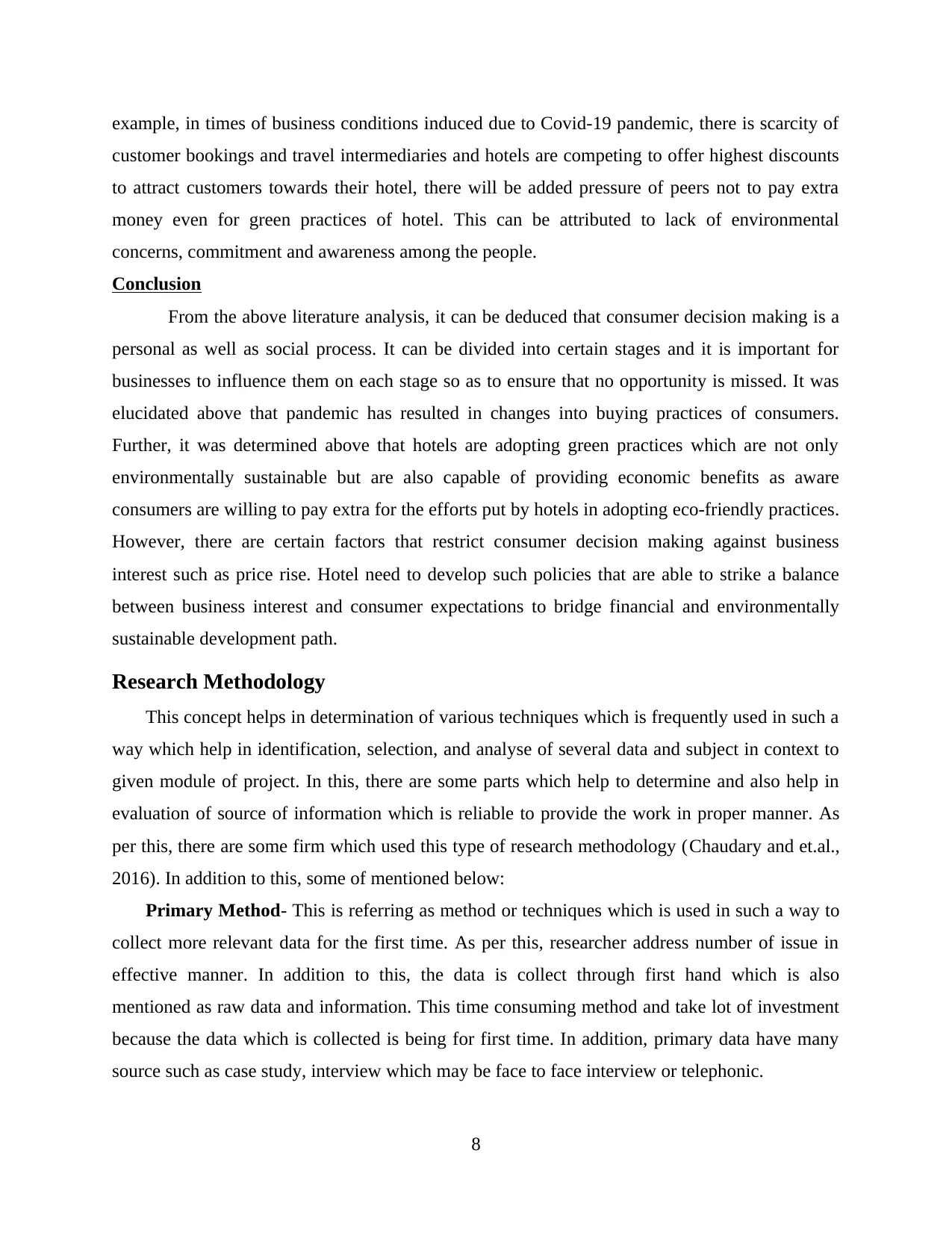
example, in times of business conditions induced due to Covid-19 pandemic, there is scarcity of
customer bookings and travel intermediaries and hotels are competing to offer highest discounts
to attract customers towards their hotel, there will be added pressure of peers not to pay extra
money even for green practices of hotel. This can be attributed to lack of environmental
concerns, commitment and awareness among the people.
Conclusion
From the above literature analysis, it can be deduced that consumer decision making is a
personal as well as social process. It can be divided into certain stages and it is important for
businesses to influence them on each stage so as to ensure that no opportunity is missed. It was
elucidated above that pandemic has resulted in changes into buying practices of consumers.
Further, it was determined above that hotels are adopting green practices which are not only
environmentally sustainable but are also capable of providing economic benefits as aware
consumers are willing to pay extra for the efforts put by hotels in adopting eco-friendly practices.
However, there are certain factors that restrict consumer decision making against business
interest such as price rise. Hotel need to develop such policies that are able to strike a balance
between business interest and consumer expectations to bridge financial and environmentally
sustainable development path.
Research Methodology
This concept helps in determination of various techniques which is frequently used in such a
way which help in identification, selection, and analyse of several data and subject in context to
given module of project. In this, there are some parts which help to determine and also help in
evaluation of source of information which is reliable to provide the work in proper manner. As
per this, there are some firm which used this type of research methodology (Chaudary and et.al.,
2016). In addition to this, some of mentioned below:
Primary Method- This is referring as method or techniques which is used in such a way to
collect more relevant data for the first time. As per this, researcher address number of issue in
effective manner. In addition to this, the data is collect through first hand which is also
mentioned as raw data and information. This time consuming method and take lot of investment
because the data which is collected is being for first time. In addition, primary data have many
source such as case study, interview which may be face to face interview or telephonic.
8
customer bookings and travel intermediaries and hotels are competing to offer highest discounts
to attract customers towards their hotel, there will be added pressure of peers not to pay extra
money even for green practices of hotel. This can be attributed to lack of environmental
concerns, commitment and awareness among the people.
Conclusion
From the above literature analysis, it can be deduced that consumer decision making is a
personal as well as social process. It can be divided into certain stages and it is important for
businesses to influence them on each stage so as to ensure that no opportunity is missed. It was
elucidated above that pandemic has resulted in changes into buying practices of consumers.
Further, it was determined above that hotels are adopting green practices which are not only
environmentally sustainable but are also capable of providing economic benefits as aware
consumers are willing to pay extra for the efforts put by hotels in adopting eco-friendly practices.
However, there are certain factors that restrict consumer decision making against business
interest such as price rise. Hotel need to develop such policies that are able to strike a balance
between business interest and consumer expectations to bridge financial and environmentally
sustainable development path.
Research Methodology
This concept helps in determination of various techniques which is frequently used in such a
way which help in identification, selection, and analyse of several data and subject in context to
given module of project. In this, there are some parts which help to determine and also help in
evaluation of source of information which is reliable to provide the work in proper manner. As
per this, there are some firm which used this type of research methodology (Chaudary and et.al.,
2016). In addition to this, some of mentioned below:
Primary Method- This is referring as method or techniques which is used in such a way to
collect more relevant data for the first time. As per this, researcher address number of issue in
effective manner. In addition to this, the data is collect through first hand which is also
mentioned as raw data and information. This time consuming method and take lot of investment
because the data which is collected is being for first time. In addition, primary data have many
source such as case study, interview which may be face to face interview or telephonic.
8
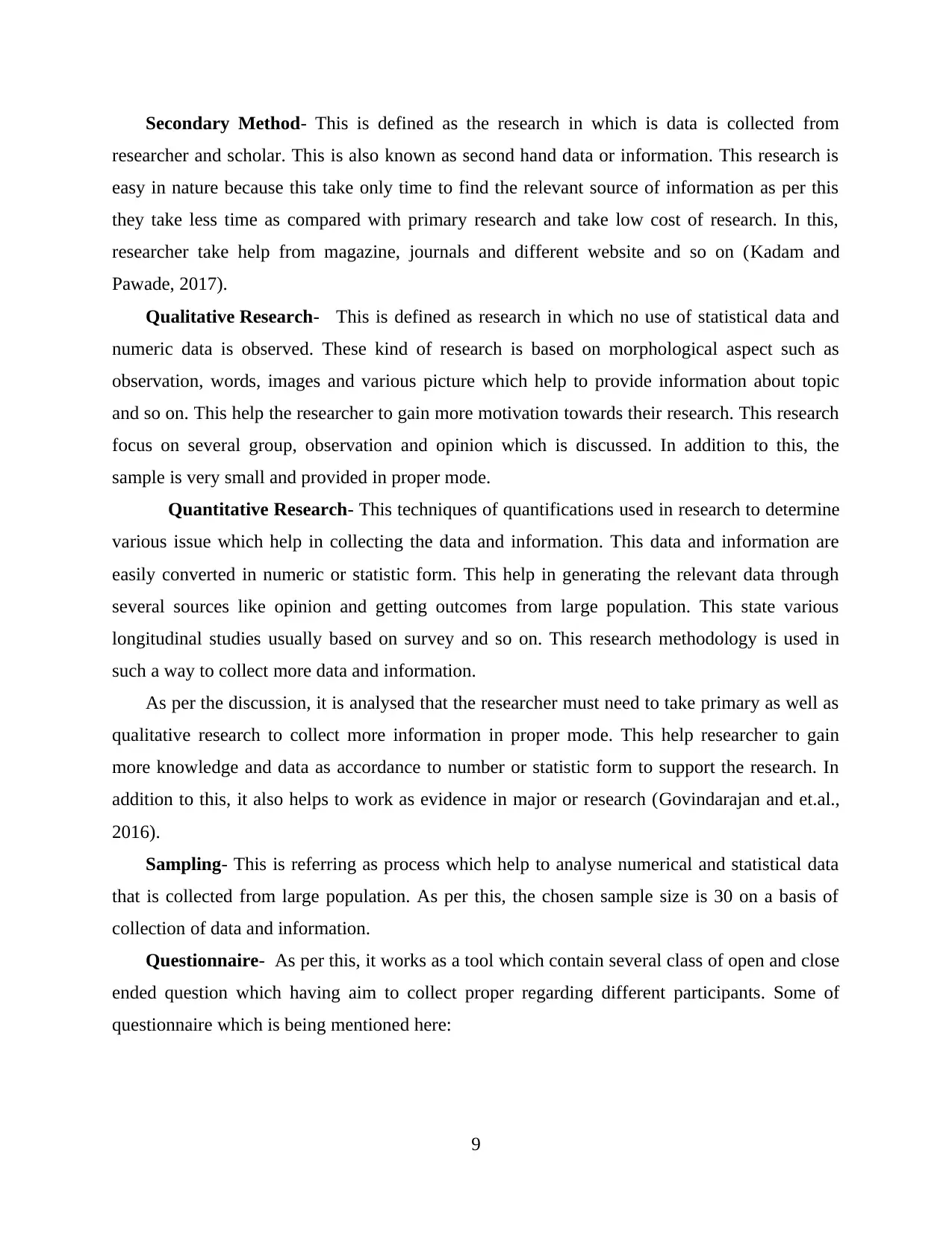
Secondary Method- This is defined as the research in which is data is collected from
researcher and scholar. This is also known as second hand data or information. This research is
easy in nature because this take only time to find the relevant source of information as per this
they take less time as compared with primary research and take low cost of research. In this,
researcher take help from magazine, journals and different website and so on (Kadam and
Pawade, 2017).
Qualitative Research- This is defined as research in which no use of statistical data and
numeric data is observed. These kind of research is based on morphological aspect such as
observation, words, images and various picture which help to provide information about topic
and so on. This help the researcher to gain more motivation towards their research. This research
focus on several group, observation and opinion which is discussed. In addition to this, the
sample is very small and provided in proper mode.
Quantitative Research- This techniques of quantifications used in research to determine
various issue which help in collecting the data and information. This data and information are
easily converted in numeric or statistic form. This help in generating the relevant data through
several sources like opinion and getting outcomes from large population. This state various
longitudinal studies usually based on survey and so on. This research methodology is used in
such a way to collect more data and information.
As per the discussion, it is analysed that the researcher must need to take primary as well as
qualitative research to collect more information in proper mode. This help researcher to gain
more knowledge and data as accordance to number or statistic form to support the research. In
addition to this, it also helps to work as evidence in major or research (Govindarajan and et.al.,
2016).
Sampling- This is referring as process which help to analyse numerical and statistical data
that is collected from large population. As per this, the chosen sample size is 30 on a basis of
collection of data and information.
Questionnaire- As per this, it works as a tool which contain several class of open and close
ended question which having aim to collect proper regarding different participants. Some of
questionnaire which is being mentioned here:
9
researcher and scholar. This is also known as second hand data or information. This research is
easy in nature because this take only time to find the relevant source of information as per this
they take less time as compared with primary research and take low cost of research. In this,
researcher take help from magazine, journals and different website and so on (Kadam and
Pawade, 2017).
Qualitative Research- This is defined as research in which no use of statistical data and
numeric data is observed. These kind of research is based on morphological aspect such as
observation, words, images and various picture which help to provide information about topic
and so on. This help the researcher to gain more motivation towards their research. This research
focus on several group, observation and opinion which is discussed. In addition to this, the
sample is very small and provided in proper mode.
Quantitative Research- This techniques of quantifications used in research to determine
various issue which help in collecting the data and information. This data and information are
easily converted in numeric or statistic form. This help in generating the relevant data through
several sources like opinion and getting outcomes from large population. This state various
longitudinal studies usually based on survey and so on. This research methodology is used in
such a way to collect more data and information.
As per the discussion, it is analysed that the researcher must need to take primary as well as
qualitative research to collect more information in proper mode. This help researcher to gain
more knowledge and data as accordance to number or statistic form to support the research. In
addition to this, it also helps to work as evidence in major or research (Govindarajan and et.al.,
2016).
Sampling- This is referring as process which help to analyse numerical and statistical data
that is collected from large population. As per this, the chosen sample size is 30 on a basis of
collection of data and information.
Questionnaire- As per this, it works as a tool which contain several class of open and close
ended question which having aim to collect proper regarding different participants. Some of
questionnaire which is being mentioned here:
9
⊘ This is a preview!⊘
Do you want full access?
Subscribe today to unlock all pages.

Trusted by 1+ million students worldwide
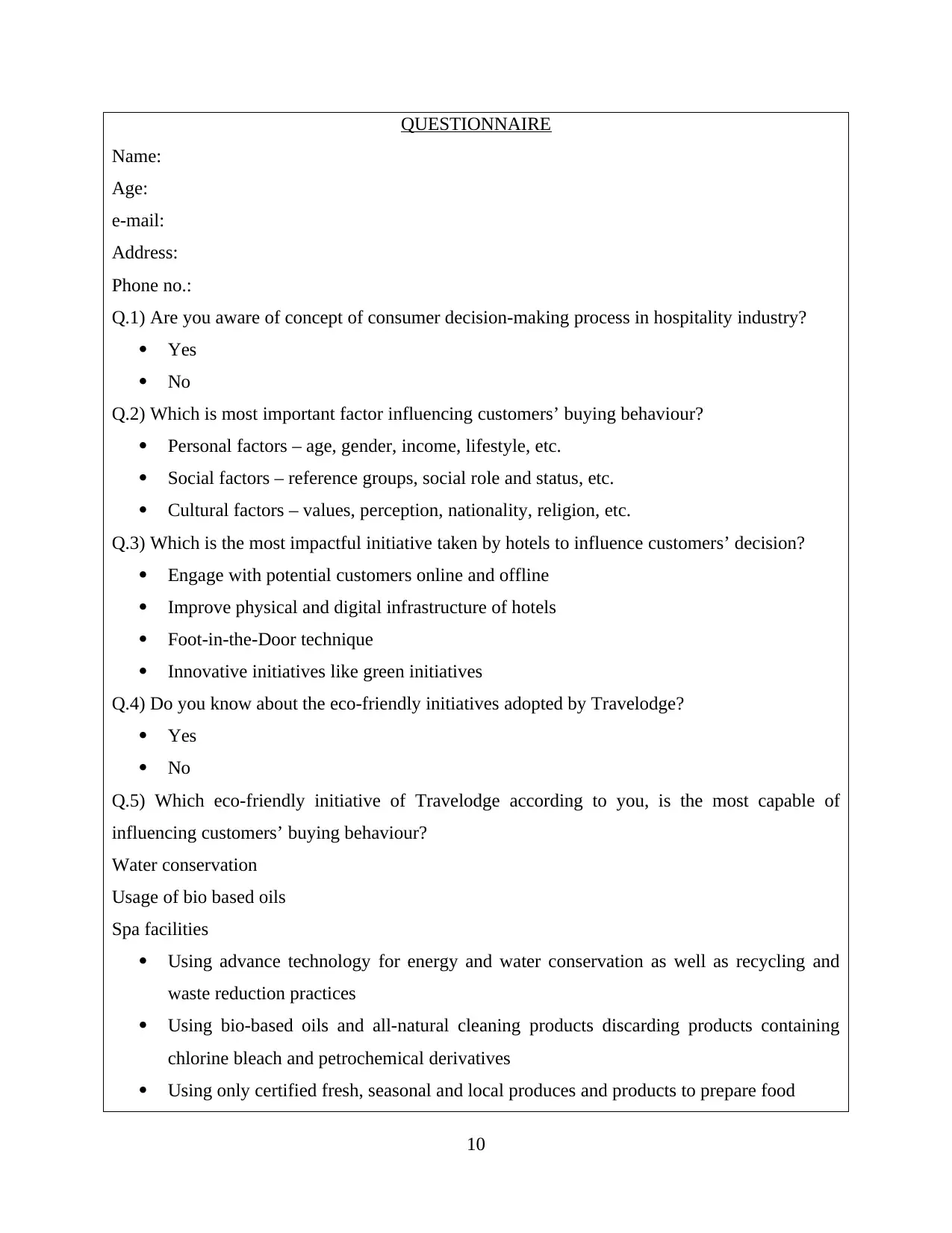
QUESTIONNAIRE
Name:
Age:
e-mail:
Address:
Phone no.:
Q.1) Are you aware of concept of consumer decision-making process in hospitality industry?
Yes
No
Q.2) Which is most important factor influencing customers’ buying behaviour?
Personal factors – age, gender, income, lifestyle, etc.
Social factors – reference groups, social role and status, etc.
Cultural factors – values, perception, nationality, religion, etc.
Q.3) Which is the most impactful initiative taken by hotels to influence customers’ decision?
Engage with potential customers online and offline
Improve physical and digital infrastructure of hotels
Foot-in-the-Door technique
Innovative initiatives like green initiatives
Q.4) Do you know about the eco-friendly initiatives adopted by Travelodge?
Yes
No
Q.5) Which eco-friendly initiative of Travelodge according to you, is the most capable of
influencing customers’ buying behaviour?
Water conservation
Usage of bio based oils
Spa facilities
Using advance technology for energy and water conservation as well as recycling and
waste reduction practices
Using bio-based oils and all-natural cleaning products discarding products containing
chlorine bleach and petrochemical derivatives
Using only certified fresh, seasonal and local produces and products to prepare food
10
Name:
Age:
e-mail:
Address:
Phone no.:
Q.1) Are you aware of concept of consumer decision-making process in hospitality industry?
Yes
No
Q.2) Which is most important factor influencing customers’ buying behaviour?
Personal factors – age, gender, income, lifestyle, etc.
Social factors – reference groups, social role and status, etc.
Cultural factors – values, perception, nationality, religion, etc.
Q.3) Which is the most impactful initiative taken by hotels to influence customers’ decision?
Engage with potential customers online and offline
Improve physical and digital infrastructure of hotels
Foot-in-the-Door technique
Innovative initiatives like green initiatives
Q.4) Do you know about the eco-friendly initiatives adopted by Travelodge?
Yes
No
Q.5) Which eco-friendly initiative of Travelodge according to you, is the most capable of
influencing customers’ buying behaviour?
Water conservation
Usage of bio based oils
Spa facilities
Using advance technology for energy and water conservation as well as recycling and
waste reduction practices
Using bio-based oils and all-natural cleaning products discarding products containing
chlorine bleach and petrochemical derivatives
Using only certified fresh, seasonal and local produces and products to prepare food
10
Paraphrase This Document
Need a fresh take? Get an instant paraphrase of this document with our AI Paraphraser
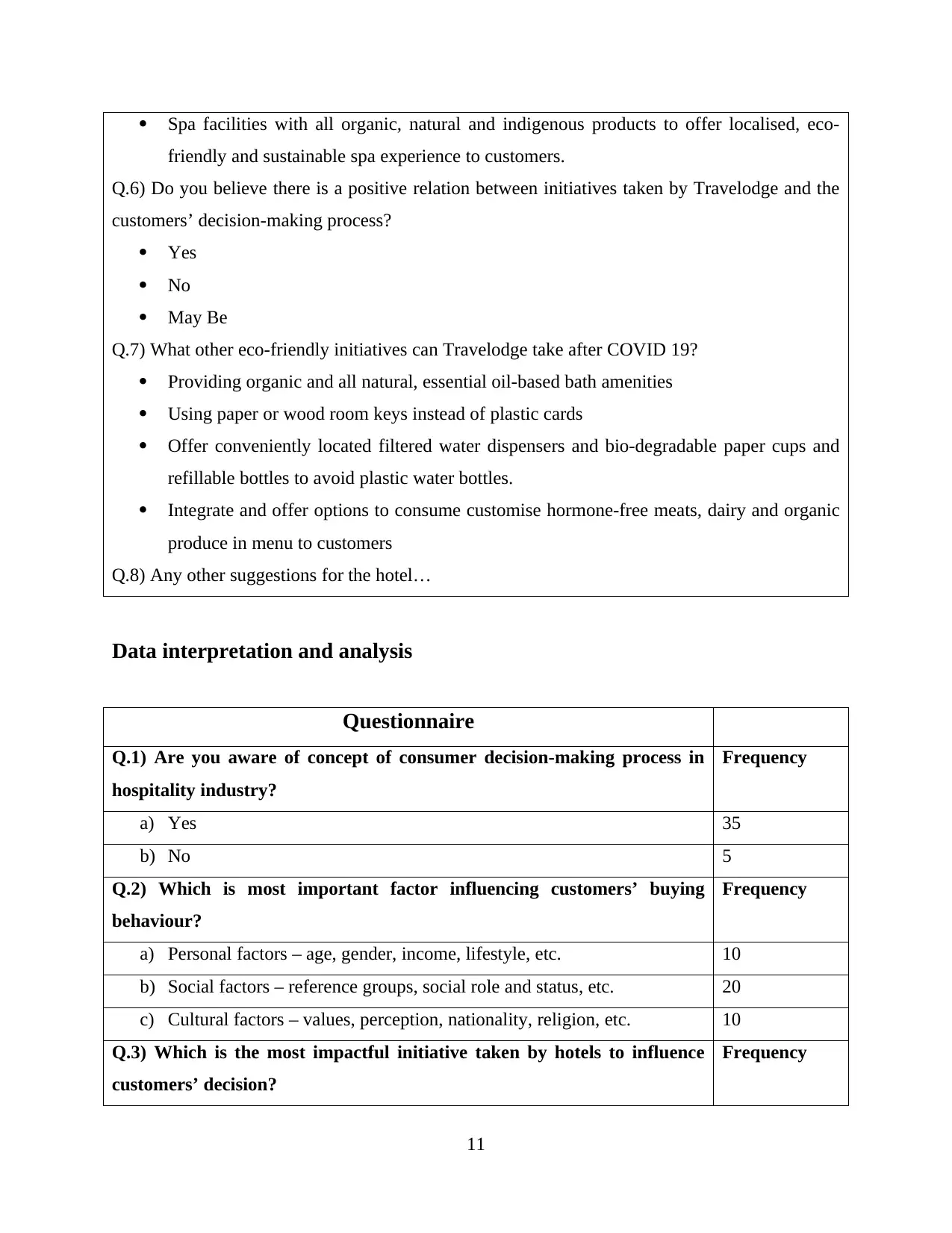
Spa facilities with all organic, natural and indigenous products to offer localised, eco-
friendly and sustainable spa experience to customers.
Q.6) Do you believe there is a positive relation between initiatives taken by Travelodge and the
customers’ decision-making process?
Yes
No
May Be
Q.7) What other eco-friendly initiatives can Travelodge take after COVID 19?
Providing organic and all natural, essential oil-based bath amenities
Using paper or wood room keys instead of plastic cards
Offer conveniently located filtered water dispensers and bio-degradable paper cups and
refillable bottles to avoid plastic water bottles.
Integrate and offer options to consume customise hormone-free meats, dairy and organic
produce in menu to customers
Q.8) Any other suggestions for the hotel…
Data interpretation and analysis
Questionnaire
Q.1) Are you aware of concept of consumer decision-making process in
hospitality industry?
Frequency
a) Yes 35
b) No 5
Q.2) Which is most important factor influencing customers’ buying
behaviour?
Frequency
a) Personal factors – age, gender, income, lifestyle, etc. 10
b) Social factors – reference groups, social role and status, etc. 20
c) Cultural factors – values, perception, nationality, religion, etc. 10
Q.3) Which is the most impactful initiative taken by hotels to influence
customers’ decision?
Frequency
11
friendly and sustainable spa experience to customers.
Q.6) Do you believe there is a positive relation between initiatives taken by Travelodge and the
customers’ decision-making process?
Yes
No
May Be
Q.7) What other eco-friendly initiatives can Travelodge take after COVID 19?
Providing organic and all natural, essential oil-based bath amenities
Using paper or wood room keys instead of plastic cards
Offer conveniently located filtered water dispensers and bio-degradable paper cups and
refillable bottles to avoid plastic water bottles.
Integrate and offer options to consume customise hormone-free meats, dairy and organic
produce in menu to customers
Q.8) Any other suggestions for the hotel…
Data interpretation and analysis
Questionnaire
Q.1) Are you aware of concept of consumer decision-making process in
hospitality industry?
Frequency
a) Yes 35
b) No 5
Q.2) Which is most important factor influencing customers’ buying
behaviour?
Frequency
a) Personal factors – age, gender, income, lifestyle, etc. 10
b) Social factors – reference groups, social role and status, etc. 20
c) Cultural factors – values, perception, nationality, religion, etc. 10
Q.3) Which is the most impactful initiative taken by hotels to influence
customers’ decision?
Frequency
11
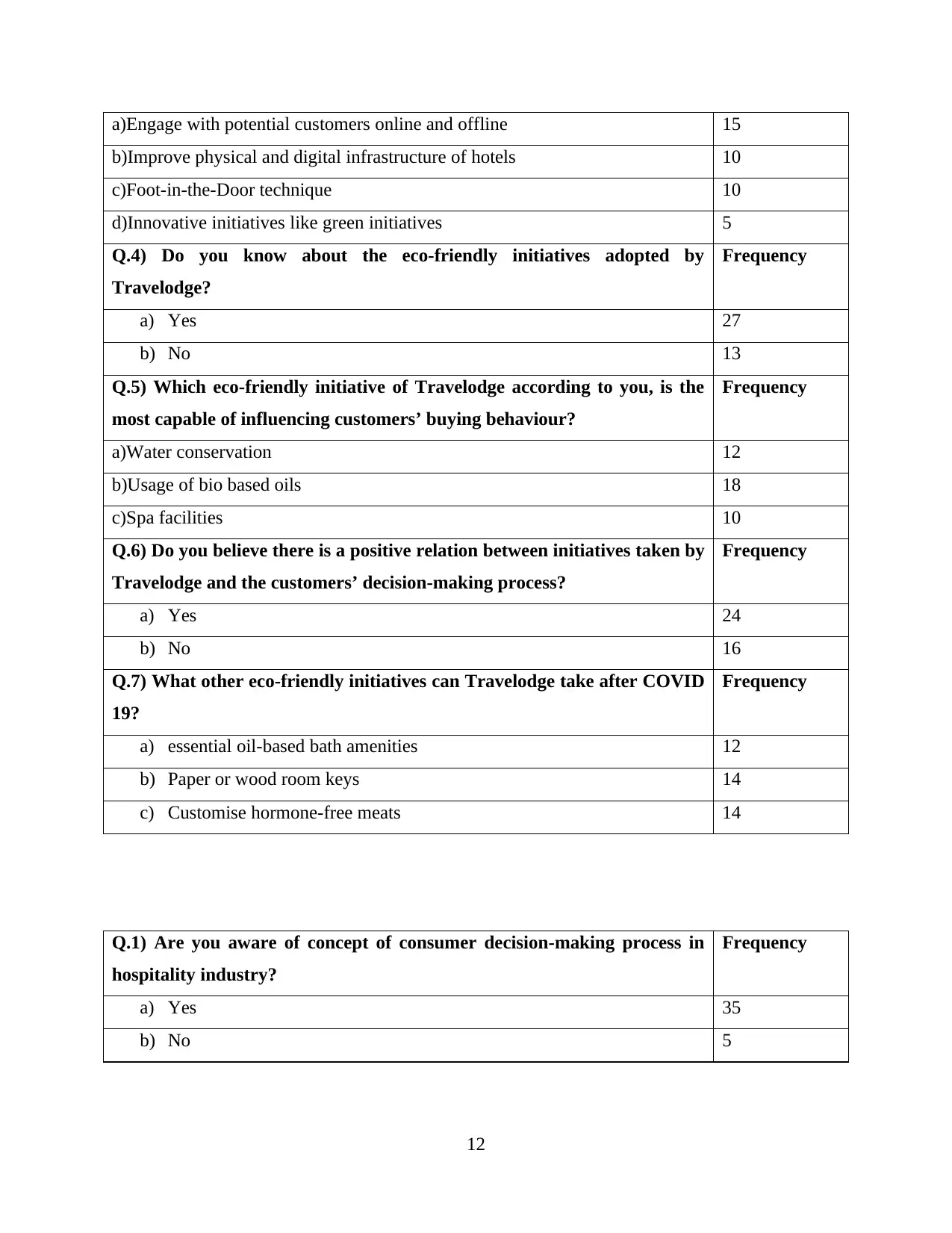
a)Engage with potential customers online and offline 15
b)Improve physical and digital infrastructure of hotels 10
c)Foot-in-the-Door technique 10
d)Innovative initiatives like green initiatives 5
Q.4) Do you know about the eco-friendly initiatives adopted by
Travelodge?
Frequency
a) Yes 27
b) No 13
Q.5) Which eco-friendly initiative of Travelodge according to you, is the
most capable of influencing customers’ buying behaviour?
Frequency
a)Water conservation 12
b)Usage of bio based oils 18
c)Spa facilities 10
Q.6) Do you believe there is a positive relation between initiatives taken by
Travelodge and the customers’ decision-making process?
Frequency
a) Yes 24
b) No 16
Q.7) What other eco-friendly initiatives can Travelodge take after COVID
19?
Frequency
a) essential oil-based bath amenities 12
b) Paper or wood room keys 14
c) Customise hormone-free meats 14
Q.1) Are you aware of concept of consumer decision-making process in
hospitality industry?
Frequency
a) Yes 35
b) No 5
12
b)Improve physical and digital infrastructure of hotels 10
c)Foot-in-the-Door technique 10
d)Innovative initiatives like green initiatives 5
Q.4) Do you know about the eco-friendly initiatives adopted by
Travelodge?
Frequency
a) Yes 27
b) No 13
Q.5) Which eco-friendly initiative of Travelodge according to you, is the
most capable of influencing customers’ buying behaviour?
Frequency
a)Water conservation 12
b)Usage of bio based oils 18
c)Spa facilities 10
Q.6) Do you believe there is a positive relation between initiatives taken by
Travelodge and the customers’ decision-making process?
Frequency
a) Yes 24
b) No 16
Q.7) What other eco-friendly initiatives can Travelodge take after COVID
19?
Frequency
a) essential oil-based bath amenities 12
b) Paper or wood room keys 14
c) Customise hormone-free meats 14
Q.1) Are you aware of concept of consumer decision-making process in
hospitality industry?
Frequency
a) Yes 35
b) No 5
12
⊘ This is a preview!⊘
Do you want full access?
Subscribe today to unlock all pages.

Trusted by 1+ million students worldwide
1 out of 21
Related Documents
Your All-in-One AI-Powered Toolkit for Academic Success.
+13062052269
info@desklib.com
Available 24*7 on WhatsApp / Email
![[object Object]](/_next/static/media/star-bottom.7253800d.svg)
Unlock your academic potential
Copyright © 2020–2026 A2Z Services. All Rights Reserved. Developed and managed by ZUCOL.





